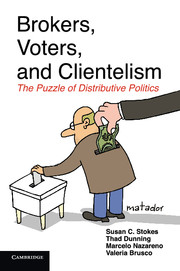Book contents
- Frontmatter
- Dedication
- Contents
- List of Tables
- List of Figures
- Preface and Acknowledgments
- I MODALITIES OF DISTRIBUTIVE POLITICS
- II THE MICRO-LOGIC OF CLIENTELISM
- III THE MACRO-LOGIC OF VOTE BUYING: WHAT EXPLAINS THE RISE AND DECLINE OF POLITICAL MACHINES?
- IV CLIENTELISM AND DEMOCRATIC THEORY
- Appendix A: Argentina Brokers' Survey
- Appendix B: Argentina Voters' Surveys
- Appendix C: Venezuela Voters' Survey and the Maisanta Database
- Appendix D: India Voters' Survey
- References
- Index
- Miscellaneous Endmatter
Appendix C: Venezuela Voters' Survey and the Maisanta Database
Published online by Cambridge University Press: 05 June 2014
- Frontmatter
- Dedication
- Contents
- List of Tables
- List of Figures
- Preface and Acknowledgments
- I MODALITIES OF DISTRIBUTIVE POLITICS
- II THE MICRO-LOGIC OF CLIENTELISM
- III THE MACRO-LOGIC OF VOTE BUYING: WHAT EXPLAINS THE RISE AND DECLINE OF POLITICAL MACHINES?
- IV CLIENTELISM AND DEMOCRATIC THEORY
- Appendix A: Argentina Brokers' Survey
- Appendix B: Argentina Voters' Surveys
- Appendix C: Venezuela Voters' Survey and the Maisanta Database
- Appendix D: India Voters' Survey
- References
- Index
- Miscellaneous Endmatter
Summary
Our original data from Venezuela provide an important empirical referent discussed in the text. In this Appendix, we provide context and background on the electoral logic of social spending and clientelistic exchanges in contemporary Venezuela, describe the “Maisanta” database as well as our original survey data, and discuss several threats to valid inference in more detail than we do in the text.
EMPIRICAL CONTEXT: THE ELECTORAL LOGIC OF SOCIAL SPENDING IN VENEZUELA
The Recall Campaign of 2003–2004
Venezuelan politics in the contemporary period provides a particularly useful opportunity to study the electoral logic of social spending. First, the election of Hugo Chávez Frías in 1998 followed a period of party system decline and then of partisan realignment that had crystallized into a new set of political loyalties by around 2003. Second, beginning in late 2003, the government launched an intense electoral campaign against a recall referendum that threatened to remove Chávez from office in 2004. Third, also beginning in 2003, the incumbent government was endowed with a rapidly expanding budget (due to the oil price boom associated with the United States-led invasion of Iraq) that it used to create a range of targeted social programs. Finally, and perhaps most importantly from the social-scientific perspective, during the recall campaign, the Venezuelan government was able to exploit a remarkable source of individual-level data on political ideology and turnout propensity, which has also become widely publicly available in Venezuela.
- Type
- Chapter
- Information
- Brokers, Voters, and ClientelismThe Puzzle of Distributive Politics, pp. 281 - 296Publisher: Cambridge University PressPrint publication year: 2013

